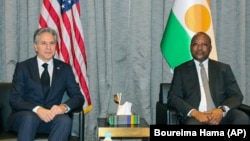Niger has faced many challenges, including violent extremism and climate crisis. “In each case,” noted Secretary of State Antony Blinken, “Niger has prioritized inclusion, community engagement, pragmatic solutions. The United States is committed to the close partnership we’ve forged together and to make it even closer,” he added during his recent visit.
Secretary Blinken announced nearly $150 million in new humanitarian assistance to help meet needs in West and Central Africa and the Sahel created by regional instability:
“That assistance will support the provision of shelter, essential healthcare, emergency food, safe drinking water, sanitation, hygiene services, and will also support vulnerable refugees and asylum seekers evacuated to Niger.”
The United States is also supporting investments in the long-term security of Niger, including helping make Niger’s law enforcement more effective in combating terrorism, strengthening border security, enhancing counternarcotics capacity, stemming trafficking, and violent extremism.
Secretary Blinken also discussed how to deal with the global food crisis:
“We’ve been supporting immediate interventions to help those facing acute food insecurity. Just since the aggression by Russia against Ukraine a year ago, we’ve contributed an additional $13.5 billion to address food insecurity around the world, but most of that has gone to Africa. We’re by far the largest donor to the World Food Program as well, and other international mechanisms that are helping to deal with food insecurity.”
The U.S. is also supporting the Black Sea Grain Initiative, which has brought Ukrainian grain to countries across Africa, said Secretary Blinken:
“Over 4 million metric tons of wheat have gone directly to developing countries as a result of this initiative. That’s the equivalent of 8 billion loaves of bread. And so, millions of people around the world – and especially here in Africa – rely on this initiative to help deal with food insecurity. It’s imperative that it continue and it’s imperative that Russia allow it to continue.”
Beyond emergency aid, the U.S. is making long-term investments in African food production capacity and resilience, because ultimately the goal is for African countries to be able to produce their own food.
There are many other ways in which we are working together to deepen this partnership, said Secretary Blinken. “Niger is really an extraordinary model at a time of great challenge – a model of resilience, a model of democracy, a model of cooperation.”






